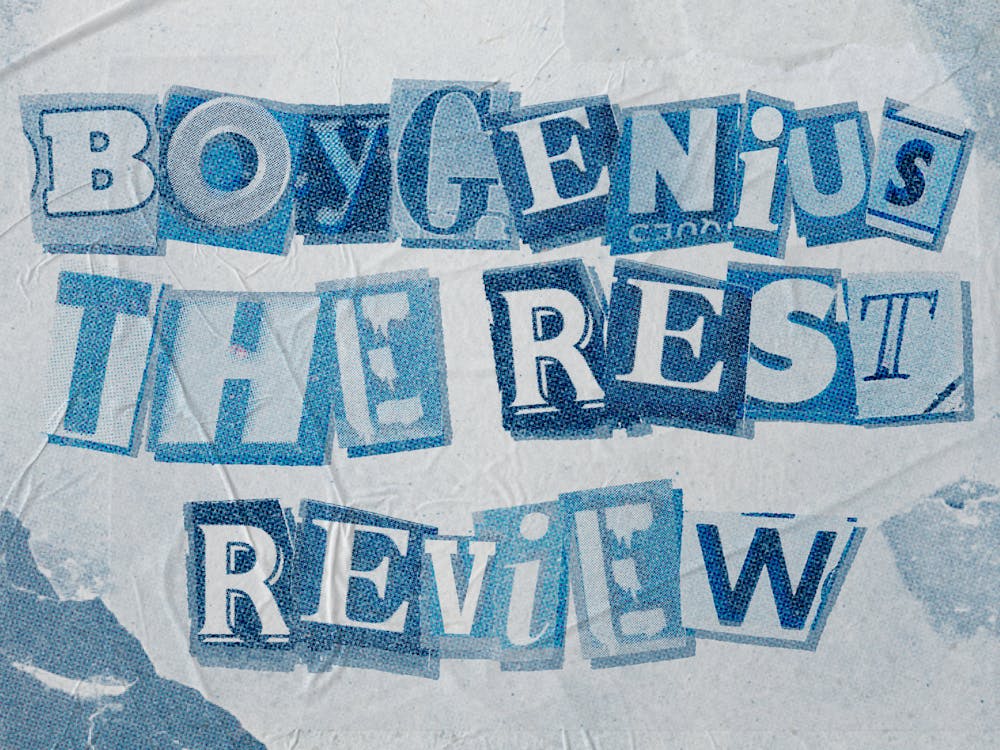While “it hurts to hope for more,” supergroup boygenius — consisting of musicians Julien Baker, Phoebe Bridgers and Lucy Dacus — has gifted the world a new project worth taking a risk on. Their four-track EP "the rest" was released on October 13, seven months after the debut of their full-length album, "the record." Despite its name, "the rest" doesn’t consist of songs scrounged from the leftover pile of "the record." Throughout the EP’s four tracks, listeners embark on a voyage of self-acceptance that is imbued with the group’s trademark melancholic musings and expert lyricism.
Despite the immense success of "the record" and tracks such as “Not Strong Enough,” which reached No. 1 on the Billboard Adult Alternative Airplay charts in June 2023, "the rest" has a brand new tone. The trio was only in the studio for a couple of days to make the tracks, and the immediacy of the decision-making shines through. As Baker remarks in an interview with Apple Music’s Zane Lowe, the sparse tracks are “slightly adorned scaffolding.” And while there may not be a number-one hit spotlighted amongst the four songs, they are raw in the most special way. Baker, Bridgers and Dacus didn’t set off to write new hits after their success. They stayed true to what fuels them as artists and dove into songwriting with the lens of poetic reflection and soft, lilting melodies.
As with each previous project, Baker, Bridgers and Dacus each have individual songs that highlight their individual strengths. The first song, “Black Hole,” starts off with the croon of Baker’s voice that permeates through the track. As the drum beat builds, the listener can envision a rocket surging into space and leaving everything behind. This song is also a callback to the “black hole opened in the kitchen” lyric from “Not Strong Enough”. In the hit song from "the record," the black hole is a reference to the all-consuming emotional turbulence of anxiety and having a panic attack. In “Black Hole,” the trio references a recently discovered supermassive black hole that is hurtling through space at such a fast pace that it is leaving a trail of new stars in its wake. This twist on the concept of destruction is echoed throughout the EP. As the song progresses and the beat climbs, Dacus sings small phrases in order to build emphasis. These short spurts seem to sonically represent the “black hole” of a whirlwind of fleeting phrases racing through an anxious mind. This can most clearly be felt when Dacus sings, “my thoughts, all noise, fake smiles, decoys/Sometimes, I need to hear your voice.” Miscommunication and the destruction of a relationship ring through as strong thematic undercurrents, and the lyrics explore the difficulty of turning away from something that is destroying you. Although you want to believe that something good will come out of the pain, the desire to run back to what hurt you still lingers.
The EP’s second track, “Afraid of Heights,” highlights Dacus’ authorial songwriting style in a very special way. By intertwining narrative storytelling with translucent and hard-hitting observations about the human experience, this song packs a surprising punch from a mellow tune and easy-going melody. Dacus sings, “'I don’t wanna live forever/ but I don’t wanna die tonight'” in response to a lover pressuring her to take a risk. There’s often such a romanticization of the idea of taking risks, with spotlights shined on those who are labeled “fearless” and “brave.” The track unburdens the weight of being pressured to take a risk, with lyrics such as “Not everybody gets the chance to live/A life that isn’t dangerous” referencing that it is a privilege to be able to avoid danger. Dacus also questions the power of hope, singing “Oh, it hurts to hope for more/Oh, it hurts to hope the future/Will be better than before.” The less you expect, the less you will hurt. But it is powerful to do something that inflicts pain because then it has purpose.
“Voyager,” the third track on the EP, is packed with Bridgers’ trademark melancholic reflection that soars through the ear to strike the heart. It is a gentle piece about the collapse of a relationship, and the sway of melody resembles the quiet rock of waves. The three verses each encapsulate their own story, and with no chorus, they nearly resemble a three-act play structure. The first verse touches on her emotional strain while currently in the relationship, while the second verse takes a reflective stance, and seems to shift her viewpoint to a further distance than the first. Bridgers sings, “You thought I’d never leave and I let you believe you were right.” This lyric ties together Bridgers’ solo songs “Letter to an Old Poet '' and “Me & My Dog” from the previous two boygenius projects, as they were both about the experience of extricating oneself from a manipulative relationship. The third verse especially rings true in this relation, as it focuses on the aftermath and loneliness found after leaving the relationship. She sings, “Walkin' alone in the city/Makes me feel like a man on the moon.” Here, a weight has been lifted after cutting ties with the person whose gravity she has been in the orbit of for so long.
The use of “the moon” as a metaphor is especially impactful, as that is a Bridgers trademark. She has sung about yearning to give someone the moon, going to space with her dog and remembering her deceased pet when she looks at the moon. The idea of being free, weightless and bound for the stars is one she has reached for throughout her discography, and the final verse of “Voyager” achieves this state. But, it is still strange and unusual. Although she has dreamt of it for so long, she “never imagined a dot quite as pale or as blue.” This choice of words references the 1990 photograph of Earth taken by the Voyager 1 spacecraft, in which Earth is described as a “pale blue dot.” As she later sings, “You took it from me, but I would’ve given it to you” in reference to this dot, listeners can interpret it as the lover took the world from her, but she would’ve given them the world. This track showcases the impact of letting go of something that was essential to release, but nonetheless changed her center of gravity.
Keeping with the space themes of the EP, the Baker-led concluding song “Powers” infuses scientific and mechanical terminology with the overarching question of self-discovery. The song is a superhero origin story of mental health, illness and personal empowerment. “I don’t know why I am the way I am” became the mantra of "the record" and here, Baker digs into her own self-origin. She sings “Thrust into bein', careenin' along/On a crooked little trajectory," describing being forced into the defining moments of your life and struggling through them. You are simply trying to make it out, but when you do, you are changed because of it. The space, nature and scientific themes are brought to a climax here with “nuclear reactors,” “collisions,” “comets,” and “destruction of matter” all being intertwined into the lyrics. After an EP about accepting the self and letting go, she questions if we are the black hole. Is it okay to be the product of absolute destruction? The song builds, and it almost feels as if drums will kick in until a mesmerizing trumpet solo begins and the entire world falls away. It is the rocket transcending in silence. It is landing on the moon.
In the Lowe interview, Baker explained that she was questioning her own songwriting abilities when writing "Powers." The trio had to pin Baker down in order to see the lyrics, and she explained that the anxious pressure is important because it has a purpose.
“The fear of fumbling it is really present because it matters. The more it matters, the more I feel the intensity of it mattering, the more I’m holding the music like a Faberge egg,” she said.
Baker doesn’t want the stakes to lower though because then the music becomes reckless and less precious. This constant pressure she holds can be heard at the beginning of “Powers,” when Baker exhales right before the vocals begin. According to Dacus, this sigh wasn’t planned and was included from the first run-through of the song. Lowe also commented on the vulnerability expressed in this production choice.
“It’s about the most real experience we get listening to someone we admire actually rising to the occasion” Lowe said.
The entire EP feels like the swell of a wave returning to the shore — infinite and tragic and intrinsic to the nature of the world. It is hopeful in a way that doesn’t disregard the dark, or the black hole, but compiles all of the lessons that have been learned through these times and paints them in a way that uplifts the listener. After the voyage of these tracks has concluded, there is a subtle shift within the audience. It is what the supergroup has the power to do, and what their dedicated fanbase enjoys — songs that tug at your heart with crooning lyrics and gentle melodies.
Bridgers, Dacus and Baker aren’t three artists known for joyful music. Their songs are often deeply sad and have been stereotyped by both listeners and music streaming platforms as “sad girl music.” This aestheticizing of mental illness does a disservice to the complicated spectrum of human emotion layered in every dark moment. As Dacus sings in “Leonard Cohen,” the 10th track off "the record," “there’s a crack in everything, that’s how the light gets in.” It is the mysterious black hole that is leaving new stars in the wake of destruction. Boygenius is no different, and although their songs pack an emotional punch, the music is layered in hope, friendship and love that wouldn’t be possible without the emotional volatility of life.
"the record," more than anything, is an album about friendship and turning to those who know you better, at times, than you know yourself. "the rest" is the final wave of love and friendship melting into the shore. It is setting sail into space after a long journey. It is returning to yourself. It is a musical voyage through what it means to be completely shattered, and forced to discover yourself while stitching everything back together. It is being okay with being a little bit broken. It is wanting to celebrate that. It is moving on and moving through. It isn’t "the record." It is "the rest."



